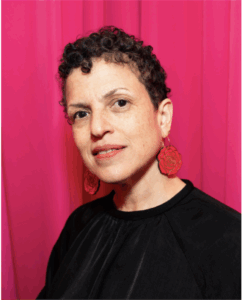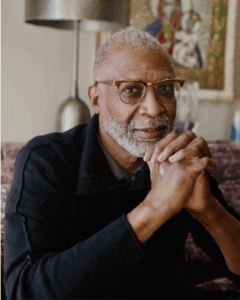Filmmakers from New York, Michèle Stephenson and Joe Brewster to lead a workshop and public film screenings in Lisbon
The award-winning filmmakers from RadaStudio New York, Michèle Stephenson and Joe Brewster—creators of acclaimed documentaries such as Going to Mars: The Nikki Giovanni Project—will be in Lisbon from 16 to 19 June 2025 to lead an intensive documentary filmmaking workshop. The initiative, coordinated by CEsA – Centre for African and Development Studies (ISEG RESEARCH/ISEG), is aimed at African and Afro-descendant videomakers.
This will be the first time Michèle Stephenson and Joe Brewster run a workshop of this kind in Lisbon, offering a unique programme that combines technical and creative excellence with a strong commitment to social activism. The workshop includes modules on screenwriting, editing, and a cinema lab, and will foster creative practice around the theme “Civic Participation, Citizenship and Democracy.”
Their visit to Lisbon will culminate in two public film screenings: Going to Mars: The Nikki Giovanni Project on 20 June at 6:00 p.m., at the Cape Verde Cultural Centre (R. de São Bento 640, 1250-220 Lisboa, Portugal); and Black Girls Play – The Story of Hand Games and Elena on 21 June at Espaço Mbongi (Praceta António Sérgio n.4 A, Queluz).

About the films
Going to Mars. The Nikki Giovanni Project (2023): Directed by Joe Brewster and Michèle Stephenson, this documentary explores the life and career of American poet and human rights activist Nikki Giovanni. Subtitled in Portuguese.
Black Girls Play (2023): A short film about the origins of the playful hand games passed down through generations of Black girls, and their influence on music, dance, and community across the broader American creative landscape. Subtitled in Portuguese.
Elena (2021): A documentary addressing universal themes such as migration, access to citizenship, and systemic racism. Director Michèle Stephenson follows Elena and her family through their everyday struggles and small joys as Haitians fighting to remain in the Dominican Republic, a country they have called home for generations. Dialogue in Spanish and Haitian Creole with Portuguese subtitles.
About the filmmakers
 Michèle Stephenson
Michèle Stephenson
Emmy Award-winning filmmaker, artist, and author Michèle Stephenson draws from her Haitian and Panamanian heritage and background as a social justice lawyer to push boundaries in documentary storytelling. She crafts emotionally resonant narratives of resistance and healing that centre the lived experiences of racialised communities across the Americas and the African diaspora. Through a Black Atlantic lens, Stephenson reimagines the storytelling form to provoke reflection and inspire action against systemic oppression, blending fiction, immersive, experimental, and hybrid formats.
In 2023, her films Going To Mars: The Nikki Giovanni Project and Black Girls Play: The Story of Hand Games were both shortlisted for the Academy Awards. Going To Mars won the Grand Jury Prize at Sundance and received the Emmy for Outstanding Merit in Documentary. Black Girls Play earned the Edward R. Murrow Award for Excellence in Video and Best Documentary Short at Tribeca.
Her earlier feature American Promise received three Emmy nominations and won the Jury Prize at Sundance. Stateless was nominated for the Canadian Screen Award for Best Feature Documentary. Stephenson also co-directed The Changing Same, a virtual reality trilogy of magical realism that premiered at Sundance’s New Frontier XR, won the Tribeca Jury Award for Best Immersive Narrative, and was nominated for an Emmy for Outstanding Interactive Media.
In 2024, she received the Nancy Malone Directing Award from NYWIFT and is currently in post-production on a feature about the Black Power movement in Canada. She is a Guggenheim Fellow, a Creative Capital artist, and a member of the Academy of Motion Picture Arts and Sciences. Based in New York City, she will be in Lisbon for this unique opportunity to lead the Cinema Lab.
 Joe Brewster
Joe Brewster
Emmy Award-winning filmmaker Joe Brewster is a Harvard-trained psychiatrist who brings his medical expertise to bear on pressing social issues through cinema. He debuted as a director with The Keeper (1995), inspired by his experience as a psychiatrist at Brooklyn House of Detention. The film received numerous awards and was nominated for the Independent Spirit Awards.
Over the past three decades, Brewster has directed and produced narrative films, documentaries, and immersive projects. His feature documentary American Promise (2014) received three Emmy nominations and won the Sundance Jury Prize. Going To Mars: The Nikki Giovanni Project was shortlisted for the Oscars, won the Grand Jury Prize at Sundance 2023, and garnered over 30 awards, including two Cinema Eye Honours and the Emmy for Outstanding Merit in Documentary.
Black Girls Play: The Story of Hand Games (2023) was also Oscar-shortlisted and won Best Short at the Cinema Eye Honours and the Edward R. Murrow Award for Excellence in Video.
Brewster also created the innovative VR experience The Changing Same, which premiered at Sundance and won the Tribeca Grand Jury Prize for Best Immersive Experience in 2021. His work in augmented and virtual reality includes O-Dogg: On Othello, featuring Tariq Trotter, which premiered at the Oregon Shakespeare Festival.
He has produced documentaries for PBS, HBO, Amazon, Al Jazeera, Vice, Sundance Channel, Comcast, Disney, and World Channel, and has been awarded fellowships by institutions including the Sundance Institute, Tribeca Film Institute, BAVC, the MacArthur Foundation, and the John Simon Guggenheim Foundation. He is a member of the Academy of Motion Picture Arts and Sciences and a multiple Emmy Award winner. Based in New York, he will also be in Lisbon to lead this unique Cinema Lab.
Author: CEsA Communication (comunicacao@cesa.iseg.ulisboa.pt)
Images: CEsA/Reproduction





